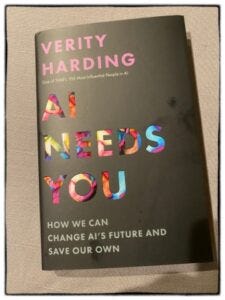Friday 15 March, 2024
Friday 15 March, 2024
Posted on March 14, 2024 by jjn1
And the mural of the story is…
Brignoles, France.
Quote of the Day
“Raw data is an oxymoron.”
Lisa Gitelman
Simple and profound truth that is rarely understood in contemporary discourses. All data collection is the product of human choices (what to collect, how to classify it, who’s included and excluded, etc.) It reminds me of Karl Popper’s point that “all observation is drenched in theory”: we only see (or notice) what we are looking for.
Musical alternative to the morning’s radio news
Zombie | Cranberries | Alexandr Misko (guitar), Alexander Boldachev (harp) Link
A string duet of the somber, defiant Cranberries song “Zombie” in tribute to Alexei Navalny, whom both musicians greatly admired.
Long Read of the Day
Something Like Fire
Will the AI revolution warm us or burn us?
Remarkable long, long essay by Michael Totten in City Journal.
The debate over whether AI will be a net positive or net negative runs along a spectrum. Google’s chief AI engineer, Ray Kurzweil, author of The Singularity Is Near, is on the optimistic (even utopian) edge of that spectrum. A few years ago, he gave a talk about what he calls the Law of Accelerating Returns—how information technology has advanced at a double-exponential rate since the 1890s. This isn’t only because of Moore’s Law, which states that the number of transistors in an integrated circuit doubles roughly every two years. Rather, information technology evolves exponentially because innovations build on one another in a positive feedback loop, a process that began before Gordon Moore was born and before integrated circuits even existed.
Exponential growth is radically counterintuitive. How much money do you think you’ll have after 30 years if you put $1 into an account that doubles in value every year? The answer: $1 billion. Thirty years after that, you’ll need exponents to render how much money you have. Think of exponential growth as a mathematical singularity, a value that approaches, but never quite reaches, infinity. In the function y=1/x, for example, as the value of x gets closer and closer to zero, the value of y explodes. You can plot y on a graph and watch it begin as a slowly rising horizontal line that accelerates upward before becoming a nearly vertical wall.
Our information technology is currently advancing at a double-exponential rate; but even if it were doing so only at a single-exponential rate, 30 years from now we will have the equivalent of a billion years of progress based on our current rate of speed, unless, for the first time ever, the growth curve finally—and dramatically—slows.
Nearly all forecasters fail to account for this…
Read on. It’s good.
Books, etc.
I went to a very interesting conversation last night between Diane Coyle (Whom God Preserve) and Verity Harding, author of a new book about how we might go about ensuring that AI is used for human flourishing.
The book has three big case-studies which in different ways illustrate ways of thinking about both enabling and controlling powerful technologies: the Space race and the United Nations’s Outer Space Treaty of 1967; the way the UK went about regulating the novel — and potentially dangerous — technology of in-vitro fertilisation (IVF); and the creation and evolution of the Internet in the period before 9/11. In conversation with Diane and members of the audience, Harding was very impressive. She also has had a remarkable range of experience in both AI (she was an early hire at DeepMind) and politics (she worked for Nick Clegg when he was Deputy Prime Minister — before he became Zuckerberg’s bagman).
So of course I bought the book, but didn’t wait to get her to sign it; the queue was too long and I was late for dinner. Looking forward to delving into it.
My commonplace booklet
Like me, Robert Reich is wondering why mainstream media isn’t covering Trump’s mental disintegration.
The media continues to discuss Trump’s criminal indictments, and is — finally! — noticing that Trump is becoming less and less coherent. But why isn’t it reporting on something almost every lawmaker and journalist in official Washington knows — that Trump is remarkably stupid?
I don’t mean just run-of-the-mill stupid. I mean extraordinarily, off-the-charts, stupifyingly stupid.
He recently claimed that magnets don’t work in water, that the Civil War was unnecessary because it should have been “negotiated,” and that no one would know who Lincoln was if he hadn’t gone to war.
Then there are the views of the people who worked most closely with him during his presidency. Secretary of State Rex Tillerson called Trump a “f—king moron?”
National Security Adviser H.R. McMaster called him a “dope?” And Treasury Secretary Steve Mnuchin, former White House Chief of Staff Reince Priebus, former White House Chief of Staff John Kelly, and even Rupert Murdoch all referred to Trump as an “idiot?” (Technically, Murdoch called him a “f—king idiot.”)
Reich’s conclusion, though, is interesting. Trump may not be intelligent on any scale that we measure it. But he has high Emotional Intelligence, at least in the sense that he is good at stoking the emotions of his fans.
Hmmm…






